Vietnam Scholars Win Four U.S. Scientific Research Awards
GIS and remote sensing application for assessment of land degradation in the Lower Mekong River Basin. Research associates – Quyet Vu, Soils and Fertilizers Research Institute (SFRI), and John Bolten, NASA, Goddard Space Flight Center.
Study on coral reef resilience in comparative areas in South Vietnam for marine biodiversity conservation in a changing world. Research associates – Tuan Si Vo, Institute of Oceanography, and Mark Eakin, NOAA Coral Reef Watch.
An assessment of smoking and access to care as risk factors for gender-differences in TB rates: a substudy of the Vietnam National Tuberculosis Program (NTP) TB prevalence survey 2016-2018. Research associates – Nguyen Van Hung, Vietnam NTP, and Payam Nahid, University of California, San Francisco.
 |
| Female scientists part of the USAID Partnerships for Enhanced Engagement in Research Science project work on biodiversity and conservation at Kasetsart University’s lab in Thailand. USAID |
Since its launch in 2011, PEER has supported more than 200 researchers in more than 45 countries, with a total investment of over $50 million.

